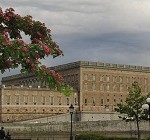I spent the last weekend in Stockholm, for a conference on Indian foreign and economic policy. The Swedish capital, or as the Swedes like to call it, the capital of Scandinavia, is a beautiful city located on the Lake Mälaren and the Baltic Sea. Its waterfront is studded with magnificent buildings dating back to the medieval times – the crown being the Royal Palace which has six hundred rooms. The country was experiencing the height of summer – darkness would set in at 11 PM while the sun would rise at 2 AM. It seemed like the locals never slept! The country has a large Indian diaspora, which has excelled as skilled labour.
I was in the city to participate in the India Trilateral Forum organised by the German Marshall Fund of the United States in association with the Swedish Ministry of Foreign Affairs. The bi-annual forum, being held after the historic Indian elections, provided a good opportunity for participants from India, the U.S. and Europe to examine India’s prospects under PM Narendra Modi.
The focus of the discussions was mostly on whether Modi will be able to make economic diplomacy the focal point of his government. Many participants felt that India under Modi will be a different one. In fact, many expressed apprehension that the country may not be as amenable to doing business with Europe as the previous governments. Another group of participants was more circumspect and expressed optimism that the Modi-Obama meeting scheduled for September will revive the relationship which has gone haywire over the last year. A few others were optimistic and talked about Modi’s dream of reviving India’s manufacturing industry and creating more jobs. On a different note, one of the participants wondered how Modi will temper the huge expectations that his campaign had generated among the Indians – like a ‘Messiah’.
Even as these discussions persisted, outside the conference, I picked up many India-related snippets. Two months back the Indian Embassy hosted ‘India Unlimited,’ a week-long programme to connect India and Sweden in the business and cultural spheres. On the streets of Stockholm, I spotted Suzuki Swift cars zipping through – a testament to the success of the India story, which most foreign MNCs have not got right as yet.
An even prouder moment waited at the Swedish Army Museum. Here, I saw a plaque next to a decommissioned Armed Personnel Carrier, which declared that the vehicle was the preferred choice for Indian troops deployed on UN peacekeeping duties – a reminder of the great sacrifices made by our armed forces towards maintaining international peace and security.
Sameer Patil is Associate Fellow, National Security, Ethnic Conflict and Terrorism, at Gateway House.
This blog was exclusively written for Gateway House: Indian Council on Global Relations. You can read more exclusive content here.
For interview requests with the author, or for permission to republish, please contact outreach@gatewayhouse.in.
© Copyright 2014 Gateway House: Indian Council on Global Relations. All rights reserved. Any unauthorized copying or reproduction is strictly prohibited


